
Has the search ranking on your website plateaued or declined over the last 12 months? It might be because you've fallen behind with adding new content and products to your website. Content is any type of written description, story, PDF document, photo, and even a video. The more you add the better your chances are to help increase your organic search results, which can lead to more traffic.
The depth of the content you have on your website doesn't just help with overall ranking, it becomes really important during specific times of the year when customers are searching for jewelry for specific purposes rather than specific jewelry itself.
For today's website review, I'm going to play out a scenario where I'm searching for a jewelry gift for someone born in the month of June. Let's pretend that I'm an everyday average person living in Davenport, IA who knows nothing about jewelry. As such, I'd have to figure out the birthstone for the month of June before looking for a gift.
Although the theoretical me might not know anything about jewelry, I've become pretty savvy with searching Google. I could search for the birthstone for June and then search for jewelry as a secondary search, but I know Google gets smarter every day, and I've already seen how Google can relate different phrases together to give me exactly what I want. With that in mind, my first search phrase is "june birthstone jewelry Davenport IA." Here are the top 10 organic results returned by Google:
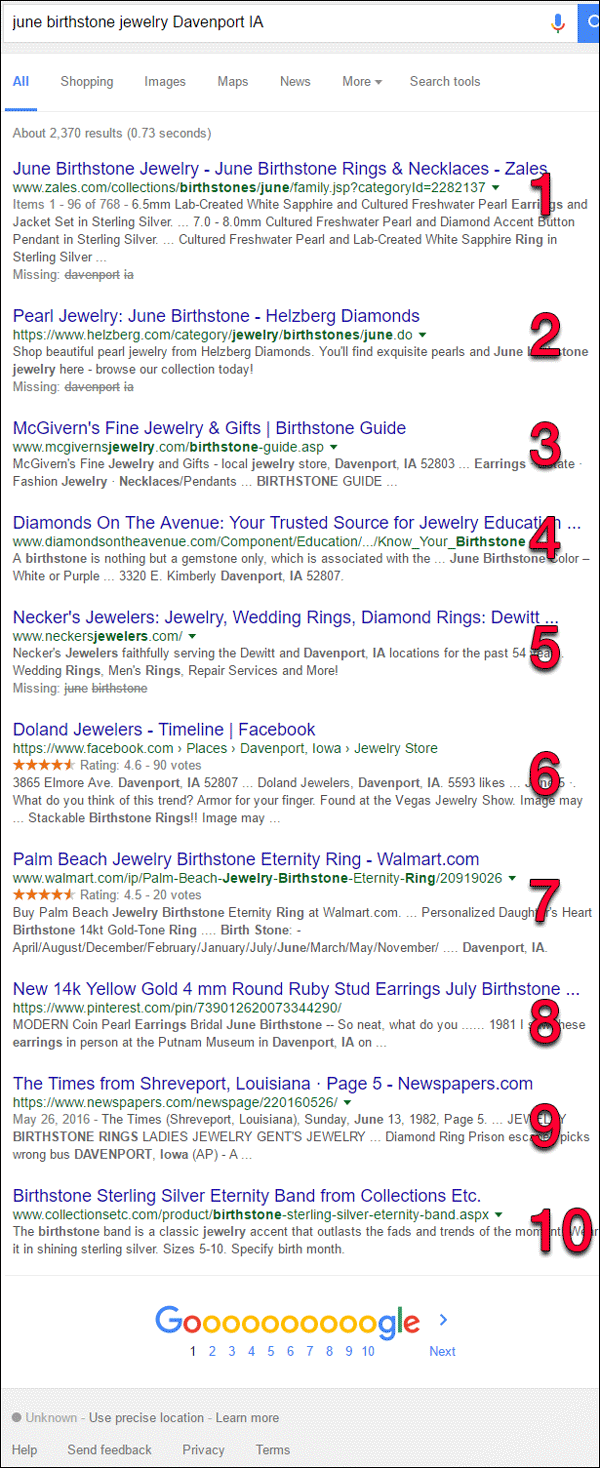
Quickly Culling the Results
Although Google tries to be helpful, it doesn't always give the best answer in 1st place. Upon a quick scan of the first two results, I see that the words "June" and "birthstones" are highlighted, but the town and state are omitted. Google even warns me that Davenport, IA is missing, take a close look:
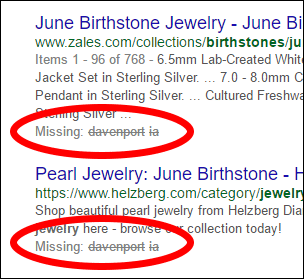
The 3rd and 4th search results look promising because Google shows the words I searched for in bold, as you can see here:
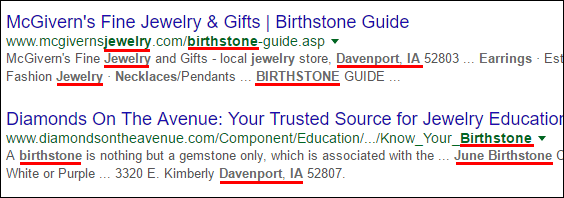
The 5th listing doesn't look appropriate because Google clearly indicated that "june" and "birthstone" is not found on that website, take a close look:

Results 5 and 8 also don't appeal to me because they are social networks. Right now, I'm on the hunt for June birthstone jewelry to give as a holiday gift, so social networks don't interest me. On the other hand, they might interest me if I was just looking for ideas.
Results 7 and 10 both say "eternity ring," which might be a bit much for a holiday gift, so I'm skipping those outright.
I'm also skipping result 9 because it looks like a newspaper website; again, I'm looking for a specific local jeweler that sells June birthstone jewelry.
I was able to scan the full set of search results and identify the only two good potential winners within 20 to 30 seconds, if that. Those winners are mcgivernsjewelry.com in 3rd place and diamondsontheavenue.com in 4th place.
Offer Better SERP Answers
Depending on how you phrase your search query, Google will format the search results to specifically answer your question. Sometimes they pull information from trusted websites to display directly on the screen, and sometimes they curate images, products, tweets, and even frequently asked questions to display in the SERPs.
The SERP shown above is the standard, no frills, format showing 10 simple results without any special details. The words shown in blue are the titles of each web page. These titles might be automatically generated or they could have been manually written by the webmaster for that site. By my estimation, the words we see in gray were automatically pulled together by Google to help me choose the right answer.
Usually the words shown in gray would be the meta description for that page, but if the meta description is blank, and when it is irrelevant to the search query, Google will rewrite it on the fly using random words and fragmented sentences found on that page. These "Franken-snippets" are identifiable by the ellipsis connecting the disjointed snippets, as shown here:

What I find interesting is that the actual birthstone for June doesn't appear anywhere in the SERP. During this 2016 holiday season, we're experiencing a buying shift away from in-person sales and towards online sales. To accommodate this new shift in buying habits, your website must, more quickly, resonate with outside-the-normal search phrases like "june birthstone jewelry Davenport IA."
One potential was to do that would be to build one product category page on your site that's dedicated to each month's birthstone. For today's example, a good page title and description might be something like this:
June Birthstone Jewelry | Pearl | Alexandrite | Moonstone
Shop our online catalog for June birthstone jewelry. Different styles of pearl, Alexandrite, and moonstone jewelry is always in stock and read for pickup or fast shipment. Visit us in Davenport, IA.
Shop our online catalog for June birthstone jewelry. Different styles of pearl, Alexandrite, and moonstone jewelry is always in stock and read for pickup or fast shipment. Visit us in Davenport, IA.
That type of page title and meta description is less likely to be rewritten by Google because it closely matches the search query. Additionally, the meta description is educational because it clearly identifies the birthstones for June while also telling me that I have two options for fast purchases. As a buyer, I'd be ecstatic if I saw the above example in the SERPs!
June Birthstone
Unfortunately, the real SERP for "june birthstone jewelry Davenport IA" didn't include the actual birthstone anywhere in it, so I had to do an explicit search for that answer. I typed "june birthstone" into Google and got these results:
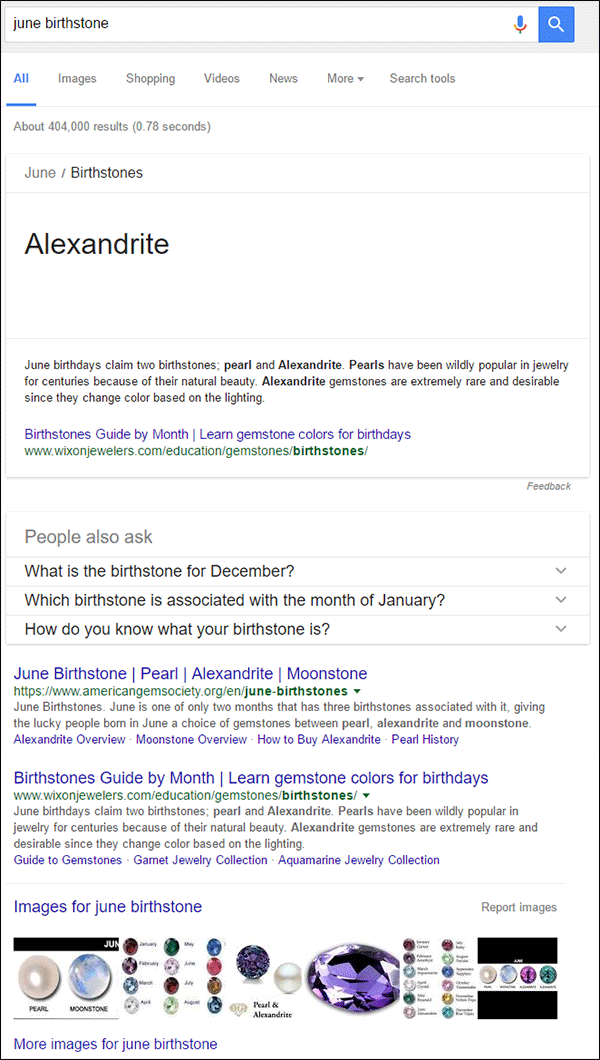
The SERP results we see here are a mix of direct information, organic results, Q&A, and images. Google curates the highest ranked information it finds online to create these advanced SERPs. Usually only the most reputable websites will be included in the curated list. In this case, Wixon Jewelers holds the highest honor because Google chose their website as the source for the "Alexandrite" answer shown above.
I'm really proud of Wixon Jewelers for continuing to have a fantastic website. I didn't know they were readers of mine when I randomly chose them as my review candidate back in October 2013. To date, I think they are my only glowing website review. I always use Google Chrome in incognito mode to write these reviews, which means that Wixon Jewelers appeared without influence from my personal search history. In the eyes of Google's automated system, they are truly highly reputable.
You Probably Never Thought This Was Misleading
Getting back to the need at hand, I'm still looking for a holiday gift for someone born in the month of June. Returning back to the original search results, I click on the 3rd option for McGivern's Fine Jewelry and landed on the page http://www.mcgivernsjewelry.com/birthstone-guide.asp shown here:
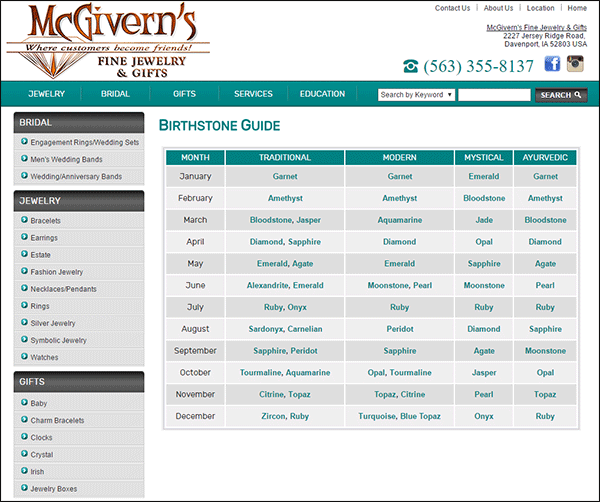
Sadly, this page doesn't help me on my quest for a gift, but it does answer the question of the type of gift I need to find. This looks like an ecommerce site, and it has a search box at the top, so I start searching for alexandrite jewelry. I'm further disappointed to see no results returned when searching for alexandrite, shown here:
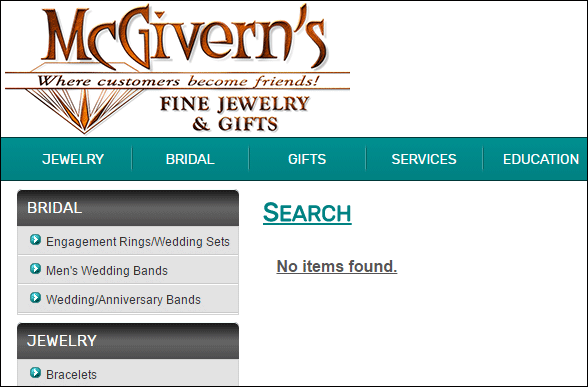
Suddenly, I feel a little aggravated by this website. I feel like I was trapped in a bait-and-switch scheme. They have educational information on their website explaining birthstones, but they are not selling birthstone jewelry through their site. Should I bother visiting their store in person just to see if they have something I might like? Could this just be a complete waste of my time?
I returned back to the original SERP again and clicked on the 4th option for Diamonds on the Avenue and landed on the page http://www.diamondsontheavenue.com/Component/Education/Gemstone_Guide/Know_Your_Birthstone shown here:
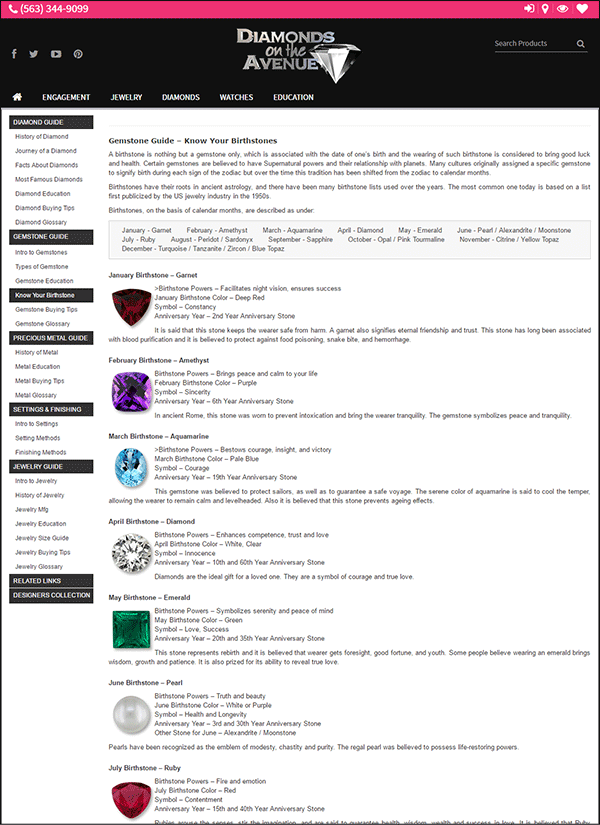
Their web page is another educational landing page for birthstones rather than a product catalog page, but they do have a search box at the top. This time when searching for alexandrite, I find one result, shown here:
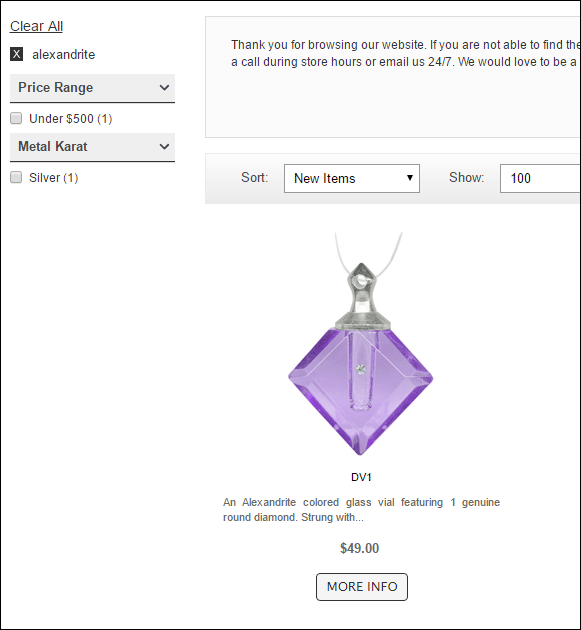
Although I don't like the pendant that was returned by this site, I'm a little more hopeful that a trip to their store might be worth my time.
Conclusions
In today's Golden Nugget, I stepped through a typical scenario of how someone might quickly analyze search results, how to potentially improve your own search results ranking, and briefly touched on ideas to improve the content on your website. These topics will become more important as ecommerce becomes more important.
The information you add to your website comes in all shapes and sizes, ranging from written information, to photos, to audio recording, videos, and downloadable PDFs. All of that stuff is called "content," and it's what Google needs to find on your website to correctly match search results to you.
Although many jewelers would like to rank highly for simple phrases like "engagement rings," it's more likely that your customers will search for phrases that match more closely to their immediate need, like "June birthstone jewelry gift ideas near me." It's more likely that Google will match long phrases like that one to the deeper content you create for your website. It's often difficult to understand the need for deeper content while you are building it, and it takes time for the positive results to build.
Additionally, if you take the time to build content focused around specific products, and if you are a retail business, regardless if you sell online or not, you should always show those products in your online catalog. The worst thing for your profitability is to spend all that time building content to attract customer only to lead them to an empty (virtual) product showcase.
Speaking on product showcases, unless you have dedicated product catalog areas to match the content you build, you need a good search tool on your website to help people find those products. In the example above, I illustrated the difficulty with finding birthstone jewelry even though the content found on the website hinted that they sold those items.
You might think of those online educational areas of your website, like the birthstone guide, as a simple sales tool for employee or customer reference, but it's more likely that those educational guides will attract customers with purchase intent. I feel the time has passed when those guides are just for educational reference. There's really no point having educational information on your website now unless you are also showing related products that you sell in your store or otherwise selling a product associated with that educational information in a direct way.
That's it for this week; I'll see you next time...
FTC Notice: I randomly choose this website and won't be telling the retailer jeweler that I'm giving them these flop fix ideas. Unless someone else tells them, they will only find out about this Nugget if they use Google Alerts or examine their Google Analytics and Google Search Console. I'm not doing this to solicit business from them, but rather as an educational exercise for everyone. This #FridayFlopFix is completely impartial and all my comments are based on previous experience in my website design and marketing agency, and from my personal research data.








